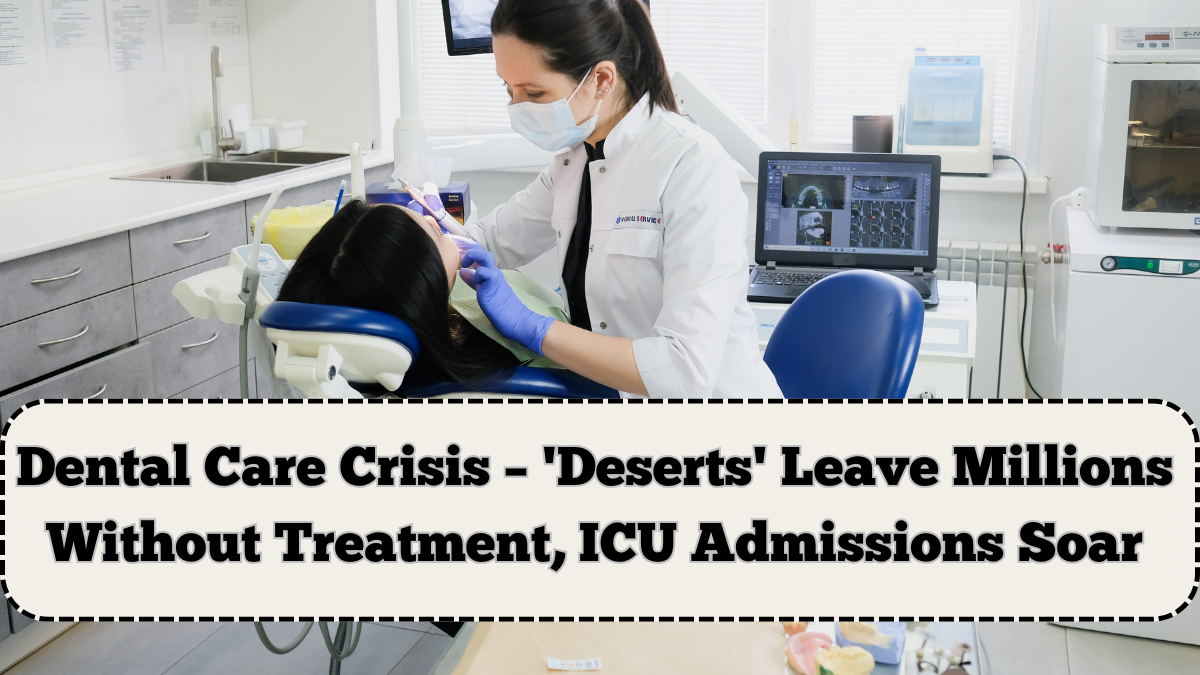A deepening dental care crisis is sweeping across the UK, leaving millions without access to basic oral healthcare. Entire communities have now become dental deserts, with no NHS dental practices accepting new patients and waiting lists stretching for months—or even years. The result is both alarming and tragic: people are turning to emergency rooms and intensive care units for problems that could have been easily treated early on.
In many areas, access to a dentist is as rare as access to a specialist, making the dental care crisis one of the most visible failures of the public healthcare system. With ICU admissions soaring due to dental infections and abscesses, the lack of timely treatment is now threatening lives.

What Are Dental Deserts and Where Are They Found?
Dental deserts are regions where residents have little to no access to NHS dental services. These areas are often rural, economically disadvantaged, or simply overwhelmed by patient demand. In some towns, not a single practice is taking on new patients, and existing patients are being told to wait months for follow-up appointments.
Recent data shows:
| Area | % Without NHS Dental Access | ICU Cases from Dental Infections |
|---|---|---|
| Lincolnshire | 78% | +34% in last 12 months |
| Cornwall | 72% | +28% |
| West Midlands | 65% | +22% |
| Parts of East Anglia | 70% | +31% |
These dental deserts are not isolated—they’re spreading, leaving millions without treatment and increasing the number of people forced to go to hospitals with severe complications.
ICU Admissions Are Becoming the Last Resort
As more people are denied timely dental care, emergency rooms are seeing a surge in patients suffering from avoidable conditions—such as tooth abscesses, jaw infections, and facial swelling. For many, these issues have escalated into life-threatening situations requiring ICU admissions and surgical intervention.
Healthcare workers report that the rise in ICU visits from untreated dental issues is unprecedented. The dental care crisis is no longer just a public health issue—it’s now burdening the entire NHS system, diverting resources that could be used elsewhere.
Why Millions Are Being Left Behind
The root cause of the dental care crisis lies in the declining number of NHS dentists and the outdated NHS dental contract, which has driven many practices to limit or end NHS appointments. With no new dentists entering underserved regions, the gap continues to widen.
Contributing factors include:
-
Chronic underfunding of NHS dental services
-
No incentives for dentists to practice in remote areas
-
High workload with low reimbursement
-
Retirements and migration to private-only practice
The consequence is a fractured system, where geography determines whether you can receive basic dental care.
Public Outcry and Demand for Urgent Solutions
Citizens, advocacy groups, and health professionals are all demanding swift and meaningful action. The dental care crisis is not just impacting individuals—it’s creating ripple effects across communities, schools, and hospitals.
Urgent reforms proposed include:
-
Revising the NHS dental contract to improve funding and fairness
-
Recruiting dentists specifically for dental deserts
-
Expanding mobile dental clinics to reach isolated areas
-
Launching emergency intervention programs to reduce ICU admissions
Until these measures are implemented, more people will suffer from preventable pain and more cases will end up in intensive care due to lack of early intervention.
FAQs
What is a dental desert?
A dental desert is an area where NHS dental services are unavailable or extremely limited, making it nearly impossible for residents to access routine or urgent dental care.
Why are ICU admissions increasing due to dental issues?
Because people cannot access basic treatment, conditions like tooth infections escalate to serious health crises, requiring hospitalization or even intensive care.
Which parts of the UK are most affected?
Rural areas and economically struggling regions, such as parts of Lincolnshire, Cornwall, and East Anglia, have some of the highest rates of no access to treatment and related hospitalizations.
Is the government doing anything to fix this?
There have been calls for reform, but no large-scale solution has yet been implemented. The crisis remains ongoing and urgent, particularly in areas labeled as dental deserts.
What should patients do if they can’t find an NHS dentist?
They can join local waiting lists, seek emergency dental hotlines, or access community health centers. However, without system-wide changes, these options are limited and often insufficient.
Click here to know more.
